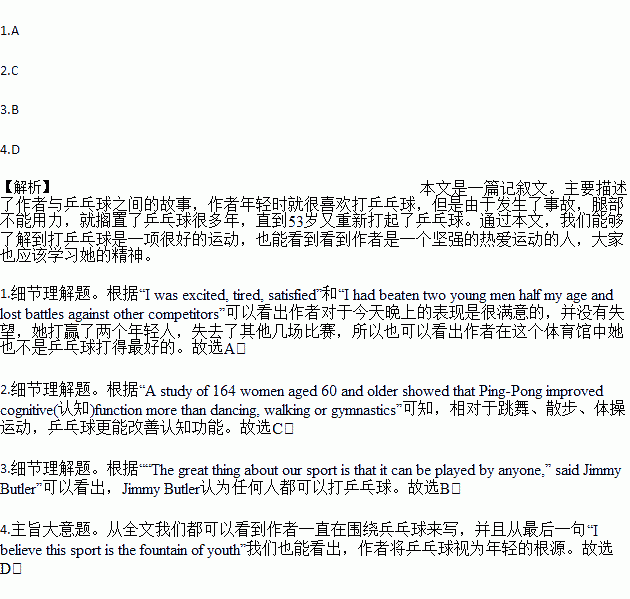题目内容
I returned home the other night, tired. My husband asked me how my evening was, “Great.” I told him. I had spent 90 minutes in a gym with 10 Ping-Pong tables and all kinds of players, all playing a little ball over the net. By 9 pm, I was excited, tired, satisfied. I had beaten two young men half my age and lost battles against other competitors. To an observer, the night was common. To me, it was a lucky thing that I hadn’t expected.
I had taken up Ping-Pong during college, and in my 30s took more advanced lessons. However, a serious accident hurt my leg, which made me unable to take exercise. Months later, I tried to play Ping-Pong but my leg pained for a week. I put the game out of my mind.
When I was 53, one day my bad leg was working a little bit better. Could Ping-Pong be possible for me, now---in my condition, at my age? I tried to play Ping-Pong again
Ping-Pong is a sport which requires endurance(耐力). Players need quick foot work and upper body movements to return balls, requiring faster response time than tennis.
Playing Ping-Pong offers benefits for the brain. A study of 164 women aged 60 and older showed that Ping-Pong improved cognitive(认知)function more than dancing, walking or gymnastics. “The great thing about our sport is that it can be played by anyone,” said Jimmy Butler, a four-time national USA Table Tennis Association winner. “I see 90-year-olds and 10-year-olds.”
Years passed and my endurance improved. People started to praise my shots. I won a game. Then I won agin. These days, I feel wonderful, I believe this sport is the fountain (源泉)of youth.
1.What can we know about the author from the first paragraph?
A. She was satisfied with herself that evening
B. She felt disappointed when losing battles
C. She lost battles against two young men
D. She was the best player in the gym
2.What sport can improve cognitive function more effectively?
A. Dancing B. Walking
C. Ping-Pong D. Gymnastics
3.What’s a big advantage about Ping-Pong sport according to Jimmy Butler?
A. It is good for the brain
B. It can be played by anyone
C. It can build up people’s muscles
D. It can improve people’s endurance
4.What’s the best title for the text?
A. My Battle with My Illness
B. A Life-changing Accident
C. My Wonderful Evening Exercise
D. Ping-Pong: the Fountain of Youth


